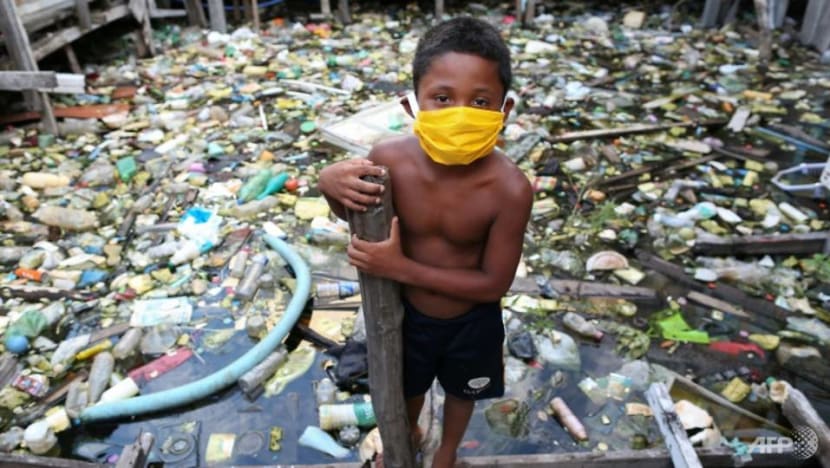Confronting the crisis: COVID-19 in emerging economies

A boy wears a face mask in the Brazilian city of Manaus on May 26, 2020. Brazil has become a new global epicenter of the coronavirus pandemic in recent days (Photo: AFP/Michael Dantas)
SINGAPORE: After weeks of lockdown, parts of the developed world are slowly opening up.
But infections in emerging economies are on the rise.
Brazil and Russia are the new hotspots. They now have the second- and third-largest number of COVID-19 cases in the world, respectively, trailing only the United States.
Experts who spoke to Money Mind warned that a social economic crisis could be looming, and the fallout could ripple across the rest of the world.
Outlining the extent of the issues facing countries with lower per capita incomes, Mr Sanjay Mathur, chief economist for Southeast Asia and India at ANZ, highlighted challenges with the availability of medicine and testing and their less well-resourced healthcare systems.
He also pointed to demographic challenges in those countries, noting their densely populated cities and how they lack enough doctors per head of population.
These are some of the reasons why India has not been able to flatten the curve, despite the imposition of a strict lockdown, said Mr Mathur.
READ: Heat, water woes and coronavirus: India's perfect storm
READ: India makes source code of contact-tracing app public
But there are also glimmers of hope.
Biomedical expert Ogan Gurel said that Indonesia, for example, has both structural advantages and disadvantages.
As an archipelago with more than 17,000 islands, national-level testing is a huge logistical challenge.
READ: Jakarta likely to be ready for 'new normal' phase after Jun 4, says coordinating minister for economy
Yet, such dispersed geography could help mitigate the spread of the infection. In a similar vein, while the African continent might have fewer resources available in the fight against the virus, it also has a young population, he said.
Many less developed countries also have prior experience with disease outbreaks, so their governments are familiar with what needs to be done when a health crisis hits.
Eoin Daly from McKinsey & Company said that governments in some emerging economies have moved quickly to expand the capacity of healthcare systems, for example, by recommissioning defunct hospitals, or leveraging on the military.
Emerging countries have also adopted other measures, such as social distancing, self-isolation and lockdowns, to control the spread of COVID-19.
Such measures, can however, be extremely painful for the world’s poorest.
READ: Commentary - Immunity passports could help restart the economy
Governments around the world face the difficult balancing task of protecting lives on the one hand, and the economic fallout on the other.
And the human toll will be particularly keenly felt in poorer countries, where many people live on what they earn that day.
Ultimately, as Mr Mathur put it, there cannot be a trade-off between lives and livelihoods.
“From an economic standpoint, it is obviously detrimental in the short term. But in the longer term, it is something that has to be done,” he said.
To cushion the impact, governments in many developed economies have rolled out stimulus packages.
But emerging economies may not have the fiscal firepower, for such stimulus packages.
READ: Italy injects record US$430b into pandemic-hit economy
READ: Japan's Abe vows unprecedented stimulus as Tokyo COVID-19 cases rise
Mr Daly said that across emerging economies, there is a high variance in ability of fiscal response, but concludes that by and large, many emerging economies are not in a position to be able to respond on the same scale as developed economies.
But given the scale of the crisis, and given that it is not just a health crisis but a humanitarian one, some economists believe that governments cannot rule anything out.
Mr Mathur said that in the short term, fiscal stimulus is needed. He pointed out that many emerging markets do not have very high public debt levels, and so, fiscal prudence is a path that can be resumed, after the pandemic is over.
READ: WHO creates foundation to boost funding in coronavirus fight
Something else to be optimistic about is the success stories among countries that have been able to flatten the curve.
Vietnam used a low-cost strategy, which included stringent lockdowns on some districts, aggressive contact tracing, and quarantine of potential carriers.
The Southeast Asian country lifted its lockdown in April, after recording 268 cases and no deaths.
BOOKMARK THIS: Our comprehensive coverage of the coronavirus outbreak and its developments
Download our app or subscribe to our Telegram channel for the latest updates on the coronavirus outbreak: https://cna.asia/telegram












